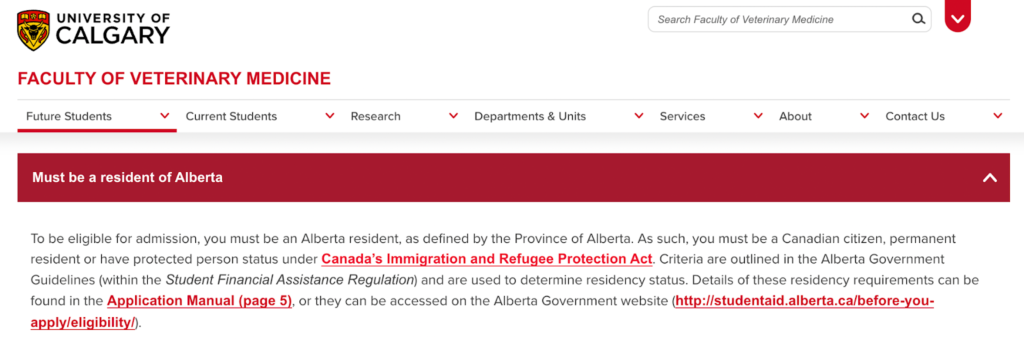Blog 17 – Want to be a Vet in Canada? Make Sure You Know These!
How to Become a Vet in Canada?
1. Start your undergraduate degree
Though you aren’t required to obtain a four-year bachelor’s degree prior to attending veterinary school, most students do complete their undergraduate degrees to meet the strict course requirements of veterinary schools.
Because subjects like organic chemistry, biology, and statistics are crucial to a veterinarian’s career path, veterinary school applicants are usually Bachelor of Science graduates.
2. Select veterinary schools and meet admission requirements
The biggest one is the fact that there are only 5 veterinary medical colleges in Canada:
1) The Atlantic Veterinary College (AVC) at the University of Prince Edward Island
2) Faculté De Médecine Vétérinaire (FMV) at the Université de Montréal
3) The Ontario Veterinary College (OVC) at the University of Guelph
4) The Western College Of Veterinary Medicine (WCVM) at the University of Saskatchewan
5) Faculty of Veterinary Medicine (UCVM) at the University of Calgary
Each veterinary school gets about 600 annual applicants, and typically they can only take 100 (Ross Universitiy, 2020). Therefore, the competition is fierce.
The admission requirements for each school could be very different. Besides the course prerequisites, students should be extremely mindful of how a school’s residency requirement may affect your admission and licensure process later on. We will take a closer look at the residency requirement in this blog.
Additionally, applicants can also be asked to provide MCAT scores and recommendation letters and to demonstrate experience with animals and the veterinary profession.
3. Complete your Doctor of Veterinary Medicine program
Congratulations! Now, you have received an offer from your dream vet school. The curriculum varies by school, but typically, you will spend the final year of veterinary school completing clinical rotations. These rotations can provide you with hands-on training which enables you to start practicing right after receiving the Doctor of Veterinary Medicine (DVM) degree.
4. Complete your licensing requirements and start your career
Passing the North American Veterinary Licensing Exam (NAVLE) is your next step to becoming a vet in Canada. “The NAVLE is a comprehensive test that allows veterinarians to practice throughout North America” (University of Saskatchewan, n.d.).
At this step, you have probably spent much time researching your different career options and have a specific geographic location in mind to kick start. You may also want to continue with your study to become a specialist.
The Residency Requirement
Canadian vet schools have residency requirements. For example, the Faculty of Veterinary Medicine (UCVM) at the University of Calgary only accepts Alberta residents (See Below). The Atlantic College of Veterinary College (AVC) accepts applicants who are residents of Prince Edward Island, Nova Scotia, New Brunswick, and Newfoundland and Labrador (University of Prince Edward Island, n.d.).

(University of Calgary – Faculty of Veterinary Medicine)
For BC residents, the Western College of Veterinary Medicine (WCVM) at the University of Saskatchewan is the vet school for you.
In fact, where you reside affects your admission significantly. As a regional veterinary college, the WCVM accepts applicants who are residents of British Columbia, Saskatchewan, Manitoba, and the northern territories. Additionally, WCVM admits applicants from each western province with an allotment system:
- British Columbia: 20
- Saskatchewan: 20
- Manitoba: 15
- Territories (Yukon, Nunavut and Northwest Territories): 1

(University of Saskatchewan – Veterinary Medicine Admission )
Final Thoughts
You may wonder if studying in the States gives you an advantage in becoming a vet. Unfortunately, becoming a vet in the U.S. will only be as difficult as it is in Canada, if not more difficult. The road to a vet requires high commitment. Therefore, Giraffe Learning always encourages its high-school students, especially these animal-lovers, to take a holistic view of the story. There is so much more involved in becoming a vet than simply loving to play with your dog. If you are unsure if the vet is the right selection for you, make sure to book a consultation with a Giraffe expert!
Reference
Ross Universitiy. (2020, October 13). Step-by-Step Guide: How to Become a Vet in Canada. Ross Vet. https://veterinary.rossu.edu/about/blog/step-by-step-guide-how-to-become-a-vet-in-Canada
University of Prince Edward Island. (n.d.). Doctor of Veterinary Medicine (DVM) | University of Prince Edward Island. UPEI. https://www.upei.ca/programs/doctor-veterinary-medicine
University of Saskatchewan. (n.d.). Veterinary Medicine – Admissions | University of Saskatchewan. Veterinary Medicine. https://admissions.usask.ca/veterinary-medicine.php#Tuitionestimates








